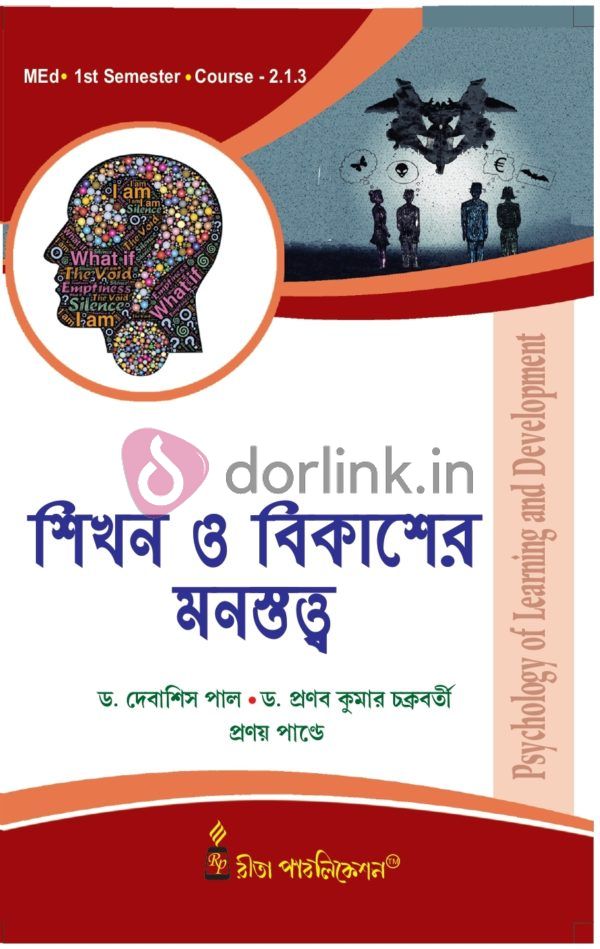×
Sikhan O Bikasher Manastattwo [M.Ed 1st Sem- Psychology]
- Shipping Time : 4 Days
- Policy : Return/Cancellation?
You can return physically damaged products or wrong items delivered within 24 hours with photo/video proof.
Contact Customer Support for return initiation and receive return authorization via email. Securely package for return.
Refunds for eligible returns are processed within 7-10 business days via Bank Transfer.
Order cancellation allowed within 24 hours of placing it. Standard policy not applicable for undamaged/wrong product cases. Detailed info. - Genre : Educational>D.El.Ed/B.Ed./M.Ed.
- Publication Year : NA
- ISBN No : NA
- Binding : No Binding Available
- Pages : NA
- Weight : NA
- Height x Width x Depth : xx Inch
MRP : ₹200.00/-
Discount : 10% Off
Your Price : ₹180.00/-
MRP is subject to change as per edition/impression by the publisher.If so, it will be notified
About the Book
Unit-1: Learning and Human Development
- Introduction to the developmental constructs and principles derived from psychological theories and the socio-political contexts that influence growth and development of young children, adolescents and youth.
- Changing perspective of psychological theories of human development;
- Neuroscience perspective of learning and development;
- Holistic approach to promoting learning and development: Importance of linking all aspects of development (physical, intellectual, social and emotional development) in the education process to promote growth and development and to facilitate the acquisition of appropriate development stage-specific cognitive and non-cognitive skill.
- Self concept and identity in adolescence.
Unit-2: Different aspects of development
- Intelligence: Nature and Evaluation of the Concept.
- Theories of Intelligence: (i) Psychometric theories with special reference to the Guilford’s SOI Model. (ii) The Information Processing Approach with special reference to Sternberg’s Triarchic Theory. (iii) Howard Gardner’s Multiple Intelligence Theory,
- Implications of theories of Intelligence in Education
- Measurement of Intelligence: Individual and Group, Verbal, Non-Verbal and Performance Tests for measuring intelligence.
- Creativity
- Stages of psychosocial development- Erikson
- Moral development- Kohlberg’s Stages of Moral Development, Gilligan’s ethics of caring.
- Stages of language development.
Unit-3: Emotion, Motivation and Attention
- Instincts and Emotions, Emotional Intelligence: Concept, Meaning with special reference to Daniel Golemen, Relationship between Intelligence and Emotional Intelligence, Implications of EI in day to day life.
- Motivation- Extrinsic and Intrinsic Motivation, Theories of Motivation- Maslow, Weiner and McClelland. Factors affecting Motivation -Self Efficacy, Locus of Control, Anxiety, Curiosity and their classroom implications.
- Attention and Interest, their class room application
Unit-4: Influence of Culture and Diversity on Learning
- Significance of contextualising education; of linking child’s existing knowledge and skills with learning process in school; importance of situating learning in the context of learner’s socio-cultural context/evironment.
- Implications of culture and diversity for learning and development; importance of linking schooling processes with the socio-cultural environment of the learner
- Implications of culture and diversity for designing learning experiences
Unit-5: Comparative Analysis/Perspective of Theories of Learning
- Changing perspectives in theories about human learning (Behaviourism, Cognitivism, Constructivism);
- Implications of different learning theories for curriculum planning and development, including designing of pedagogical practices (teaching learning and learning assessment processes.
Unit-6: Transfer of Learning and Memory
- Transfer of Learning – Concept, Importance, Nature & Types. Contemporary views of general transfer & specific transfer. Theories. Methods of enhancing transfer.
- Mechanism of memory, types of memory, economy and training in memory
- Causes of forgetting

